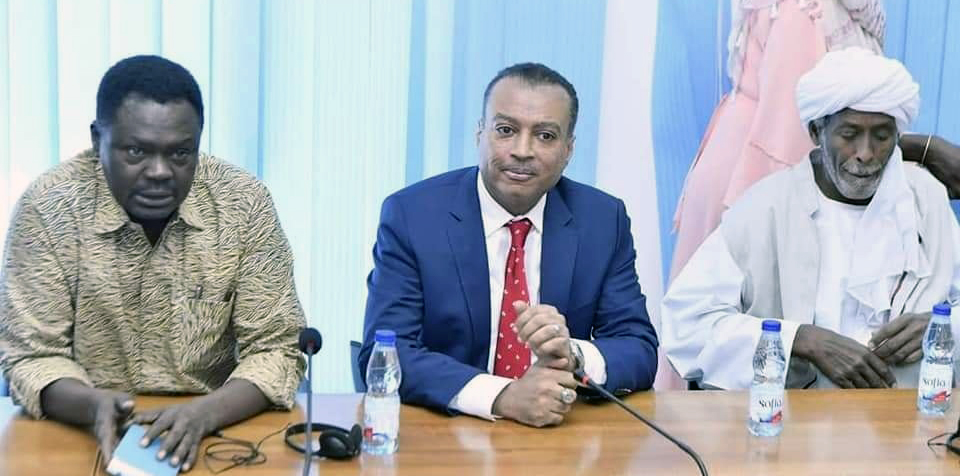Sudan’s FFC factions divided on Egyptian dialogue offer

Leaders of the Forces for Freedom and Change-Democratic Block (FFC-DB): Minni Minawi Jaafar Mirghani Sayed Tirik (Photo: Supplied)
Sudan’s Forces for Freedom and Change-Democratic Block (FFC-DB) faction has announced its support for the Egyptian initiative to open a platform for a Sudanese-Sudanese dialogue in Cairo. However, the mainstream Forces for Freedom and Change Central Council (FFC-CC) rejects the idea.
As previously reported by Radio Dabanga, on Monday, the Director of the Egyptian General Intelligence Directorate (EGID), Maj Gen Abbas Kamel, held separate meetings with Lt Gen Abdelfattah El Burhan, President of the Sovereignty Council and Commander of the Sudan Armed Forces, leaders of the Forces for Freedom and Change-Central Council (FFC-CC) and of the FFC-Democratic Bloc alliance of rebel movements and the Democratic Unionist Party.
Sources reported that Kamel proposed a new platform for dialogue between the parties, to be held under Egyptian auspices.
The press office of the Sovereignty Council said that the Egyptian Intelligence director conveyed an oral message from Egyptian President Abdelfattah El Sisi to El Burhan, regarding bilateral relations.
Juma El Wakeel, spokesperson for the FFC-DB alliance, based on the FFC-National Accord set up in April last year by rebel leaders who signed the 2020 Juba Peace Agreement with the Sudanese government, stressed the importance of the Egyptian role in the Sudanese dialogue, “though the proposal came very late”.
Therefor the Democratic Block calls on “all political forces, except for the [dissolved] National Congress Party, to discuss the Egyptian initiative,” he told Radio Dabanga yesterday. “We regret that the Trilateral Mechanism [mediating the current talks between the military and opposition groups] is not keen on the participation of a large number of political forces in the dialogues.”
The FFC-DB did not sign the Framework Agreement, El Wakeel explained, because it “does not include issues of identity, religion and the state, dialogue with non-signatories to the peace agreement, and wants to revise the Juba Peace Agreement”.
He accused the mainstream FFC-Central Council of “hijacking the scene”, and deplored the FFC-CC’s refusal to sit with all members of the Democratic Block. “the Framework Agreement will play a major role in deepening the wounds and exacerbating the crisis in Sudan.”
The Framework agreement was signed in Khartoum on December 5 by a number of political parties and (split-off) groups. Each of them separately signed the document before the AU-IGAD-UN Trilateral Mechanism. According to the FFC-CC, the only parties of the FFC-DB entitled to sign have been previously agreed upon, namely the Justice and Equality Movement and the Sudan Liberation Movement faction led by Minni Minawi.
The FFC-DB was formed two months ago. In a press conference in Khartoum on November 3, speakers said that the alliance includes the National Accord Forces (NAF), the Democratic Unionist Party (DUP), and the Sudanese Ba’ath Party, amongst others. In early December, the eastern Sudanese High Council for Beja Nazirs faction presided by Sayed Tirik joined the group.
Rejected
The FFC-CC said in a press statement on Tuesday that their Liaison Committee met the visiting Egyptian delegation headed by the Director of the Egyptian General Intelligence Directorate (EGID), Maj Gen Abbas Kamel, on Monday.
They told him that they welcome all possible forms of Egyptian support for the Framework Agreement, and said that they “adhere to the fact that the Framework Agreement constitutes the agreed basis for a political solution”.
The statement said that the Egyptian side affirmed its keenness on the success of the political process in Sudan, which is led and owned by the Sudanese, and its willingness to do everything possible to bring the views of the various Sudanese parties to the process closer.
Spokesperson Jaafar Hasan said in an interview with Al Jazeera Live that they refused during the meeting with the Egyptian delegation to sit down with members of the FFC-DB and the National Forces group and confirmed that discussion of the Framework Agreement are limited to its signatories.
He said that a FFC-CC delegation will visit Cairo in the coming days as part of a scheduled visit to a number of Arab and regional capitals.











 and then
and then